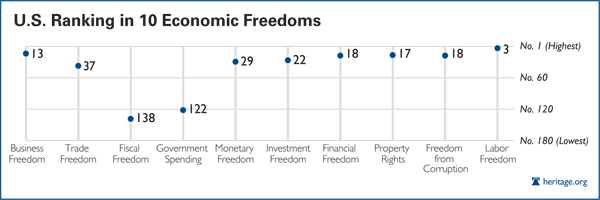THE ISSUE:
In 2010, for the first time ever, the United States has fallen from the ranks of the economically “free” as measured by the Index of Economic Freedom, published annually by The Heritage Foundation and The Wall Street Journal, falling below the cutoff that earns countries the right to call themselves “free.” The status of the United States today? “Mostly free.” The reason? Notable decreases in financial freedom, monetary freedom, and property rights. The U.S. scores particularly badly in areas where the government has taken too large and intrusive a role. This decline must be reversed.
- Fiscal Freedom. U.S. personal and corporate marginal income tax rates are higher than the world averages of 29% (personal) and 25% (corporate). The overall U.S. tax burden (28.3% of GDP in 2008) is also considerably higher than the world average of 23.2%.
- Government Spending. In the past two years, spending has exploded, reaching 24.7% of GDP in 2009 and estimated to grow further to 25.4% in 2010. The growth of the federal budget deficit has been even more explosive, adding about $1 trillion to the national debt in 2009 and again in 2010.
- Financial Freedom. Since 2008, the Troubled Asset Relief Program (TARP) and similar programs have bailed out a wide variety of financial firms. These bailouts include government attempts to micromanage businesses on the theory that since they have accepted U.S. taxpayers’ dollars, they must respond to political control from Washington.
- Corruption. To be successful in its role as honest regulator of various industries, the government must be seen as neutral and disinterested. In 2009, however, the U.S. government became part owner or effective operator of several “too-big-to-fail” companies. The impartiality of subsequent regulatory efforts was seen by some as compromised.
- Reduce Tax Rates. Our corporate income tax rate, currently the second highest in the developed world, must be cut to restore U.S. competitiveness. The corporate tax rate should be set at or below the Organisation for Economic Co-operation and Development average of 26% to eliminate the incentive for businesses and jobs to move overseas. We should also stop taxing businesses as individuals, but rather reduce rates to 25%, which would help business to grow and create jobs. The U.S. needs lower, flatter taxes without multiple layers of taxation on personal savings and investment and other forms of capital. A reduction of the overall tax burden on Americans to a level consistent with or lower than world average tax levels would improve fiscal freedom.
- Spend Less and Devolve Responsibilities. Congress should enact a firm cap on the annual increase in total government spending, limited to inflation plus population growth. Lawmakers should exert all effort to keep overall federal spending to less than 20% of U.S. GDP, the historical post–World War II average for federal spending.Congress should take entitlement spending off autopilot and subject it to the discipline of the budgetary process through long-term budgets that Congress regularly reviews. This would force entitlement spending to compete politically with other spending priorities. The responsibilities of federal agencies for transportation, agriculture, and education should be devolved to the states. The new health care bill that centralizes so much decision-making and funding in Washington must be repealed. State and local governments can tailor programs to make them more efficient and can experiment with new approaches to reduce the overall cost of government.
- Unwind Government Intervention. The government should end the interventions it has made since 2008, starting with abolition of the TARP program. It should then abolish Freddie Mac and Fannie Mae and repeal all U.S. government regulatory measures that interfere with mortgage markets. Congress should also repeal the Sarbanes–Oxley Act, which discriminates against small firms and reduces competition. Companies should be allowed to fail, and laws and regulations should create no expectation of a future bailout.
- Reduce Government Involvement in Commercial Decision-making. Congress must eliminate the insidious practice of earmarking, which corrupts the legislative process. The government needs to divest itself of all assets acquired in connection with the financial crisis and recession and refrain from interfering in bankruptcy cases. These reforms, like the others, would both complement and reinforce the overall restoration of America’s economic freedom.
- Give Workers a RAISE. Union contracts set both a wage floor and a wage ceiling. Unionized employers may not give productive workers pay raises outside those envisioned in the collectively bargained contract. Unions usually demand that employers reward workers for “time served” rather than “hard work.” No matter how exemplary the employee, wages cannot exceed than what his union contract specifies. This “seniority ceiling” removes the incentive for outstanding performance and limits the union member's upward mobility. The RAISE Act (Rewarding Achievement and Incentivizing Successful Employees) would allow employers to pay individual workers more, but not less, than the union contract specifies. The RAISE Act would provide workers with the incentive to increase productivity. Current federal law caps the wages of 8 million American workers. The RAISE Act would restore to millions of union members the inherent American right to earn individual raises through individual efforts.

